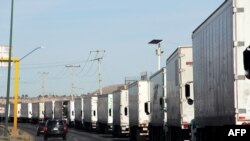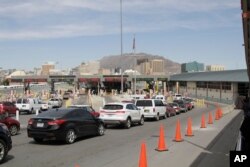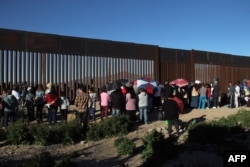Iacopo Luzi and Laura Sepulveda from VOA's LATAM service and White House Correspondent Patsy Widakuswara contributed to this report.
WASHINGTON — This week U.S. President Donald Trump threatened to impose tariffs on Mexico or close its border with the United States entirely "if the drugs don't stop or largely stop."
The Trump administration has made strengthening border security a centerpiece of its domestic policy, even though public opinion polls show Americans are roughly split over substantially expanding a wall along the border.
In El Paso, Texas, a border town across the U.S.-Mexico border from Ciudad Juárez, many residents also express mixed feelings about a border closure that would directly impact their lives more than those of most Americans.
Last year, 7 million pedestrians crossed the U.S. border at the El Paso international bridges to either work or study, according to the U.S. Department of Transportation. Vehicles with passengers reached the 22 million mark.
Cars, classes and tourists
For graphic design student Paula Lopez, who goes to school in El Paso but lives in Ciudad Juarez, shutting down the pedestrian crossing could affect her education.
"If they close the border, I will have to miss my classes and I am allowed a maximum of five absences," Lopez said.
Oscar Lira, an intensive care nurse at a medical center in El Paso, says a potential closure would affect people's health and job security.
"In fact, the treatments would be worse for everyone," Lira said, adding that a lot of health workers in El Paso live in Ciudad Juarez, which means if they can't come to work, the extra services would fall to those on the U.S. side.
Even local Republican supporters of the president have expressed concerns. Adolpho Telles, El Paso County Republican Party chairman, was "very concerned" that even a partial closure of the border could hurt the Texas border town.
"People keep joking that we're going to run out of avocados here in a couple weeks ... but that's not the important part. They [people living across the border] make wire harnesses, component parts for vehicles. They come over here. They ship them east, and then on the East Coast to use, to finish the manufacturing cycle," Telles said.
For years, American businesses have restructured their manufacturing so that many products are made on both sides of the border. Border closures could have far-reaching impacts on a wide range of businesses.
Roger Noriega of the American Enterprise Institute, a conservative Washington-based policy research group, said the president's closure threat sows doubt among regional partners and businesses. And he says it remains unclear how it would work.
"If it were absolutely dire emergencies, conceivably, you could say that people can enter ... [but] "you need people moving across that border for commercial reasons for tourism, really, in both directions," Noriega said.
Telles, however, still agrees "there's going to have to be some closures in certain areas."
He notes U.S. Customs and Border Protection agents are "stretched thin," and that closures in certain areas could mean reassigning some officers "so they can get better control of the areas and control [of] the people that are trying to come across the border."






